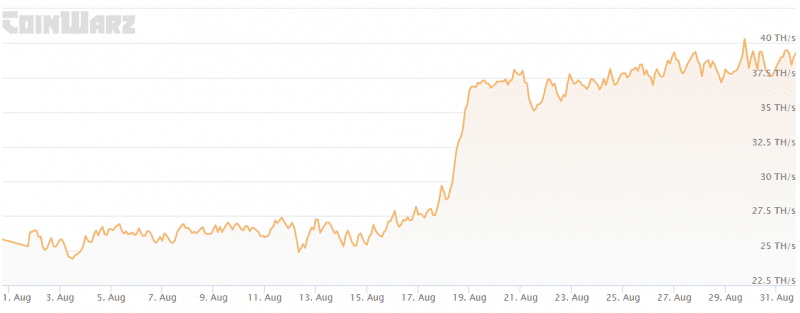Table of Contents
TogglePrior to the Merge event, Ethereum Classic experiences a significant rise in hashrate. It has experienced an 83% increase in hashrate since June, according to the data. Thus, the Merge seems to have become a determining factor in the subsequent ETC rally.
In contrast, the hashrate of Ethereum (ETH) has dipped by 11% ahead of the upcoming Merge upgrade. The ever-increasing prices of electricity around the globe and the decreasing mining profitability of Ethereum are currently the major concerns.
Ethereum Classic Experiences a Significant Rise in Hashrate

Ethereum Classic (ETC) displayed an 83% increase in hashrate in two months, according to the data. The main factor for the rise in the ETC hashrate can be considered as the Merge which will occur in mid-September.
What is ETH Merge?
The Ethereum blockchain is the technical infrastructure that allows countless Web3 applications and crypto and NFT projects to exist. The merge (sometimes called Ethereum 2.0, Eth 2, or ETH 2.0) is an upgrade to the Ethereum blockchain that will reduce its environmental impact, increase security in the network, and enable Ethereum developers to introduce new features and increase the scalability of the chain.
Along with Bitcoin, Ethereum is one of the most popular blockchains in the world, with a market cap of nearly $190 billion as of writing. Aside from the millions of NFTs the blockchain authenticates, innumerable other decentralized apps and decentralized financial systems depend on the blockchain to function.
A successful merge could be a sorely needed shot in the arm to an ecosystem that is weathering yet another crypto winter. Moreover, while many see the merge as a big win for Ethereum and its environmental impact, not everyone is happy about it.
What is Ethereum Classic – ETC?
Ethereum Classic is a fork of the Ethereum blockchain launched after the Ethereum blockchain had to be rolled back and relaunched in 2016 after the hack of The DAO project, causing a split within the Ethereum community.
Following the historic DAO attack, which continues to be one of the most major hacking instances in cryptocurrency history, the Ethereum network was forked into two different chains back in 2016. Those in the community that wished to keep the previous hacked chain alive founded Ethereum Classic.
Those who did not support the relaunch maintained the original Ethereum blockchain, renamed to Ethereum Classic. Unlike Ethereum, which has no cap on the total number of coins, Ethereum Classic is capped at 210.7 million ETC.
Back in August 2020, the Ethereum Classic chain was hit by several 51% attacks within the same week, which made many question its security.
Holders of Ethereum Classic (ETC) are cautiously watching the mining activity of its blockchain, as the merge of Ethereum (ETH) and its transition to the proof-of-stake consensus mechanism puts more attention on the six-year-old cryptocurrency.
Popularity of Ethereum Classic
The popularity of ETC is continuously growing among the mining community as is evident from the hashrate chart. While some miners want to create a hard fork of Ethereum to retain their livelihood, others may redeploy their gear to mine other proof-of-work cryptocurrencies, like Ethereum Classic.
Ethereum Classic, which works on a Proof-of-Work consensus mechanism, witnessed a sudden boom in its total hashrate. ETC’s hashrate grew by more than 50% in just a month, indicating an influx of new miners in the ecosystem ahead of the Merge. Additionally, while the total hashrate increased, ETC’s price also followed a similar route by outperforming several leading cryptos last month.
Currently, ETC holds the fourth position in the list of the world’s top PoW tokens in terms of market capitalization. However, if trading volume is to be taken into consideration, ETC nabs the third spot on the list, proving the coin’s worldwide popularity.
It is to be noted that since mid-August, ETC’s price has shown much volatility. This raises some serious questions around the altcoin being able to sustain its price in the long run.





